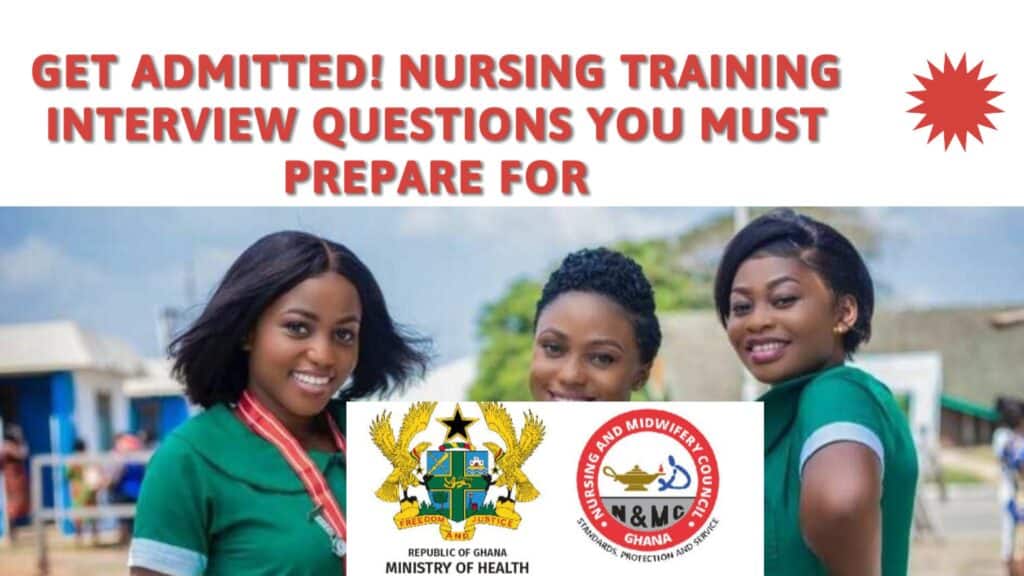READ THE CONTENT BELOW

RMU CUT-OFF POINTS FOR UNDERGRADUATE ADMISSIONS
RMU cut-off points and needs for undergraduate admission 2025/2026 academic year are what you need.
Nevertheless, to get a high school diploma or its equal and have excellent grades in other subjects such as mathematics, physics, and English.
Check this article https://mcchrisconsult.com/uew-cut-off-points/
Also, RMU’s reputation as the leading maritime education institution attracts a significant amount of applications from around the globe every year.
Furthermore, RMU wants student to first meet the basic needs and also meet the cut-off points before being considered for admission.
After all RMU cut-off or needs for Undergraduate admission is that a student must obtain credit passes.
(A-D) in six (6) subjects to meet the cut, which consist three core subjects such as English Language and Mathematics.
Furthermore, any three (3) electives subjects in Business, Arts, or Science.
Scheme through the table below to and find your program and its corresponding cut-off point
Purchase your E-voucher here at https://mcchrisconsult.com/ghana-university-forms/
To get more info or details about the courses visit https://rmu.edu.gh/undergraduate-programmes/
B.Sc. Accounting
The Regional Maritime University invites applications from prospective candidates for admission into its B.Sc. (Accounting) programme starting in September 2018 on its main campus at Nungua.
Aim of the Programme
The B.Sc. (Accounting) programme aims at providing students the knowledge, skills and disciplines essential to enable him them to perform at the middle level of management of the accountancy profession in industry, commerce or academia in the private or public sectors of the economy. The programme also lays the foundation for the graduating student to attain higher academic or professional qualifications for future career development to higher management levels in the accountancy profession and the business world.
Structure of the Programme
The programme is for four academic years with each year divided into two semesters. Each semester shall consist of sixteen weeks with fourteen weeks for lectures and tutorials, one week for revision and two weeks for the conduct of end-of-semester examinations. Five courses will be taught in each semester with each course attracting four contact hours of teaching and tutorials. All courses are core. Thus all courses are weighted equally and are given the same importance.
Four contact hours have been adopted to give maximum coverage to each course to afford the student the opportunity to acquire as much knowledge as possible. This will help their future career development, especially those wishing to pursue a career in the accountancy profession or attain higher academic qualifications. Very often students writing professional exams rely on low value private tuition. The programme will ensure that graduating students are self-reliant owing to the wide coverage and depth of each course.
Students wishing to seek practical work throughout the length of the programme are encouraged and will be provided adequate assistance.
Accreditation
The programme is accredited by the National Accreditation Board (NAB) of Ghana and endorsed by the five Member States of Regional Maritime University namely: Ghana, Cameroon, Liberia, Liberia, Sierra Leone and The Gambia
Minimum Admission Requirements
The minimum admission requirements for the programme are:
a. Senior Secondary School Certificate Examination (SSSCE), West African Senior School Certificate Examination (WASSCE) and General Business Certificate of Examination (GBCE).
i. An applicant with SSSCE must have credit passes (A – D) in six subjects comprising three core subjects, including English Language and Mathematics, plus any three electives subjects
ii. An applicant with WASSCE must have credit passes (A1 – C6) in six subjects comprising three core subjects, including English Language and Mathematics, plus any three electives subjects
iii. An applicant with GBCE must have credit passes (A – D) in six subjects comprising three core subjects, including English Language and Mathematics, plus any three electives subjects
b. General Certificate of Education (GCE) Advanced Level
An applicant with GCE Advanced Level must have passed three subjects ( at least, one of the passes should be Grade D or better. Also the applicant must have had credits passes (Grade 6) in five GCE Ordinary Level subjects including English Language, Mathematics and a Science subject (for a non- science student) or an Arts subject (for a Sconce student
c. Advanced Business Certificate Examination (ABCE)
An applicant with ABCE candidate must hold a Full Diploma Certificate in ABCE. In addition, the applicant must have credit passes in five subjects including English Language, Mathematics, Integrated Science or Social Studies in the General Business Certificate Examination (GBCE) or SSSCE or WASSCE
d. Mature Candidates
An applicant applying as a mature candidate must be at least 25 years old, and show proof of age with birth certificate or any legitimate documentary proof of date of birth which is at least 5 years old at the time of application.The candidate shall be required to write and pass an examination consisting of English Language, Mathematics and an Aptitude Test conducted by the University.
e. Foreign and other Qualifications
All foreign and other qualifications beyond the ones specified above shall be referred to the National Accreditation Board for the establishment of their equivalences to determine their eligibility for admission to the University.
Mode of Application
[I] DOMESTIC APPLICANTS
All applicants for the 2018/2019 Academic Year admissions are required to use the Regional Maritime University [RMU] online application portal. The procedure for the online application process is as follows:
[a] Make a payment of GH¢150.00 or $50.00 for the RMU E-Voucher at the sales centers listed below:
Sale Centers
[i] Regional Maritime University, Nungua – Accra, Cash Office
[ii] All Branches of the Ghana Commercial Bank
[iii] All Branches of Ecobank [foreign and local]
[iv] All Regional and District Post Offices across Ghana.
[b] The E-Voucher contains the Pin and Serial Number required in completing the online form.
[c] Access the online form by visiting the University’s online admissions portal at www.rmu.edu.gh/admissions soon after payment.
[d] In completing the online form, students will be required to upload their passport size photographs.
[e] A completed form is not considered until it is SUBMITTED.
[f] Applicants must print out application summary; attach transcripts, certificates and all other relevant documents. These documents should be forwarded to the Registrar.
[g] Candidates are strongly advised to visit Courier Companies in their Countries for assistance towards the return of the application documents [see f].
[h] Completed application forms and other documents should be addressed to:
The Academic Registrar
Regional Maritime University
Post Office Box GP 1115
Accra – Ghana
[II] INTERNATIONAL APPLICANTS
[a] Log onto the admission portal : www.rmu.edu.gh/admissions
[b] Click on International Applications and follow the instructions displayed on the page for the completion of the form.
[c] Applicants must print out application summary; attach transcripts, certificates as well as all other relevant documents and send same to the above address.
CLOSING DATE
The closing dates for submission of application forms are Friday, 27th July, 2018 for Mature and 31st August, 2018 for Regular and Weekend applicants. Candidates should note that no application will be accepted after the deadline. Mature Entrance Examinations would be held on Friday, 10th August, 2018.
Facts Sheet on Regional Maritime University (RMU)
Regional Maritime University is the only regionally-owned (Cameroon, The Gambia, Ghana, Liberia, and Sierra Leone) University in the West and Central African sub-regions empowered to deliver academic and professional programmes for the maritime industry. It started as the Ghana maritime Academy in 1958 as an Institution wholly owned by the Government of Ghana. Then in 1983 the Institution changed its name to Regional Maritime Academy when four other countries in West Africa decided to become part owners of the Institution. The Institution attained higher status when it was granted full university status with a Charter to award its own degrees in 2007 and appropriately changed its name into Regional Maritime University.
The campus of the Institution is located at Nungua.
Regional Maritime University is, thus, the only private university in the sub-region owned by five member nations.
In 2016 the Board of Governors of the University, realising the importance of business education to the maritime profession, decided to introduce business courses into its maritime programmes culminating into in the establishment of a Faculty of International Business and Humanities and starting with an undergraduate programme in Accounting to be followed by other business disciplines later.
BSc. Computer Engineering
The ICT industry is emerging as one of the largest global industries with the potential to absorb large numbers of suitably qualified people in the West African sub-region. The course equips graduates with the requisite hardware and software skills to enable them design, commission and manage complex ICT projects in office and industrial automation.
Benefits to you
- Find ready employment in the Banks, Civil Service, Utilities, Manufacturing Industries etc.
- Gain an academic qualification providing opportunities for career progression and job satisfaction.
What is covered?
- Information Technology;
- Mathematics;
- Digital Electronics;
- Communication Engineering;
- Advanced Computer Architecture;
- Data Base Internet Management, etc.
BSc. Marine Electrical & Electronics Engineering
Competency based course to equip graduates to man fully automated and unmanned machinery spaces, electrical/electronic systems on board modern ships and on-shore. Theories and supported with dynamic demonstrations in ICT technologies.
Benefits to you
- You will be eligible for employment as sea-going or shore-based officer and as an electrical engineer in reputable organizations worldwide that deal with hydro-electric power, broadcasting, aviation, and manufacturing, among others.
- You will be equipped with knowledge of Information and Communication Technologies (ICT) to meet the challenges of time.
- You will be prepared for a career in the maritime industry as electro-technical officer.
- Gain an academic qualification providing opportunities for career progression and job satisfaction.
What is covered?
- Engineering Science;
- Electronics;
- Electrical Engineering;
- Computer Studies; Telecommunications;
- Seamanship;
- Principles of Management; Law, etc.
BSc. Marine Engineering
Engineering based maritime education and training that matches modern technologies and innovations in shipboard operations on merchant ships and in fishing vessels and allied industries.
Benefits to you
- You will be equipped to aspire to Engineering or managerial positions onboard merchant ships or shore-based institutions;
- Learn about the whole spectrum of engineering activity hands-on and be enabled to apply engineering principles in the solution of problems;
- Gain adequate scientific and technological skills to cope with modern innovations in the maritime industry;
- Gain an academic qualification providing opportunities for career progression and job satisfaction
What is covered?
Seamanship, etc.
Electrical, Mechanical and Naval Engineering;
Engineering Principles and Practices;
Principles of Management;
Law;
Workshop Technology,
BSc. Logistics Management
The programme is run in collaboration with Shanghai Maritime University [SMU], China.
Global trends in industrial production, trade and transport has created the need for specialist training of manpower to fill important gaps that have emerged in logistics and supply chains e.g. warehousing/distribution, shipping and indeed total transport management documentation and etc.
The general objective is to educate and train supervisory/ middle level managers/operatives to handle the various activities in both domestic and international supply chains.
What is covered?
- Transport Economics;
- Transport Insurance;
- Logistics System Planning & Design;
- Storage and Distribution Management;
- Logistics System Simulation;
- Warehouse Practice and Research Methods.
Duration of Degree Programmes
The duration of the Degree Programmes is four (4) years or eight (8) semesters.
However, B.A Logistics students will have their Level 300 in SMU, China and full cost to be borne by students.
BSc. Nautical Science
Training in Nautical Science equips graduates with professional expertise to manage transport systems both on board and ashore. The international demand for highly-qualified nautical science graduates is significant.
Benefits to you
- Your employment potential will be broadened as you will be equipped to take up Deck Officer positions on international merchant navy ships, or officer positions in government ministries and agencies related to Marine Transport;
- You will be armed with adequate science and technology skills to enable you cope with the rapid advances, challenges of the maritime industry in the sub-region and internationally;
- You will be prepared to assume higher responsibilities on merchant ships and fishing vessels;
- You will be offered the opportunity to have a broad-based preparation for a career in the shipping industry associated with maritime service both at sea and ashore;
- Gain an academic qualification providing opportunities for career progression and job satisfaction.
What is covered?
- Navigation
- Naval Architecture
- Nautical Astronomy;
- Meteorology;
- Seamanship;
- Economics; Ship Business
- Computer Studies; Law etc.
BSc. Ports & Shipping Administration
The programme offers comprehensive and liberal maritime education and training for entry into the world of commercial shipping and ancillary businesses. It provides a high level training that will promote and enhance efficiency in the administrative, managerial and operational skills of shore-based maritime personnel.
Benefits to you
- You will be equipped to take up supervisory and middle level management positions in shipping agencies, maritime and transport related ministries, export and import industries, etc.
- You will be provided with skills to match current trends and challenges in administration and management practices in maritime business;
- You will be equipped with specialist as well as general business procedures of day to day operations of ports, shipping and related business.
- Gain an academic qualification providing opportunities for career progression and job satisfaction.
What is covered?
- Port Management;
- Ship Management;
- Principles of Management;
- Economics
- Maritime Safety and Environmental Protection;
- Maritime Law/Insurance/Labour Relations;
- Human Resource Management; Marketing Management, etc.
Applicants will be required to attend a selection interview.
Need More Information?
WE’RE HERE TO HELP
Call or Email us:
(00233)(0)205003366
[email protected]
Regional Maritime University
Nungua, P.O. GP 1115
Accra, Ghana
Mon – Fri 8:00A.M. – 4:00P.M.Send a message
Why Study at RMU?
Founded in 1958, the Regional Maritime University is one of the oldest maritime universities in Africa and boasts a rich and proud history.
Our courses are developed in collaboration with industry and government bodies, placing our highly skilled graduates in high demand across the globe.
We are ISO certified and globally recognised as being a centre for excellence. Our specialist teaching, learning and research facilities are internationally acclaimed and are utilised by government bodies and maritime-related businesses world-wide.
THE NAUTICAL SCIENCE DEPARTMENT
Nautical Science is a programme under the Faculty of Maritime Studies at the Regional Maritime University (RMU). At the undergraduate level, there are options for Degree and Diploma in Nautical Science. The programme encompasses the knowledge of navigation, seamanship and ship operation.
Over the years, the department has trained students to assume officer responsibilities on merchant ships and prepare them for careers in the marine related fields ashore.
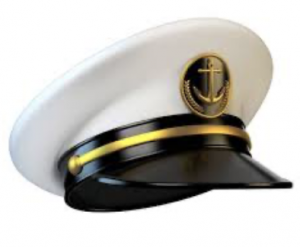
Progressively, the Department has chalked some remarkable achievements worth noting. Most past students from the department are working as navigation officers with international shipping companies like Pacific International Lines (PIL), Bernhard Schulte Shipping Management (BSM), Celebrity Cruise Company, and Swire Pacific among others. Others are also working as pilots at the Ghana Ports and Harbours Authority (GPHA).
The Programmes offered by the department are as follows:
- BSc. Nautical Science
- Diploma in Nautical Science
- General Purpose Rating (PreSea Vocational)
- Class One Deck Certificates of Competency
- Class Two Deck Certificates of Competency
- Class Three Deck Certificates of Competency
Graduates from the department can work on off shore-based maritime industries as Navigating Officers; onboard merchant ships as well as other shore-based maritime or allied industries as lecturers and Marine consultants etc.
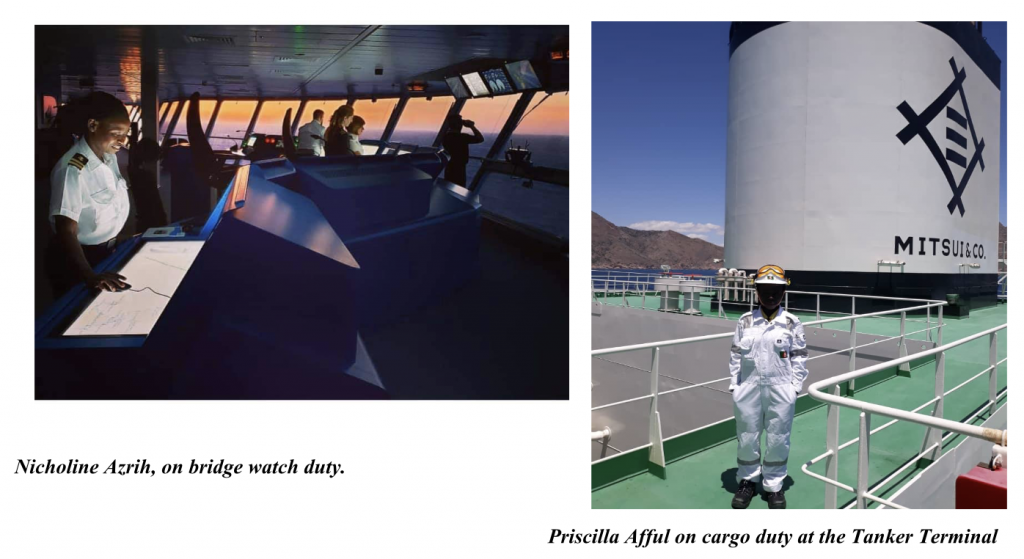
Past students from the department are working as navigation officers with international shipping companies.
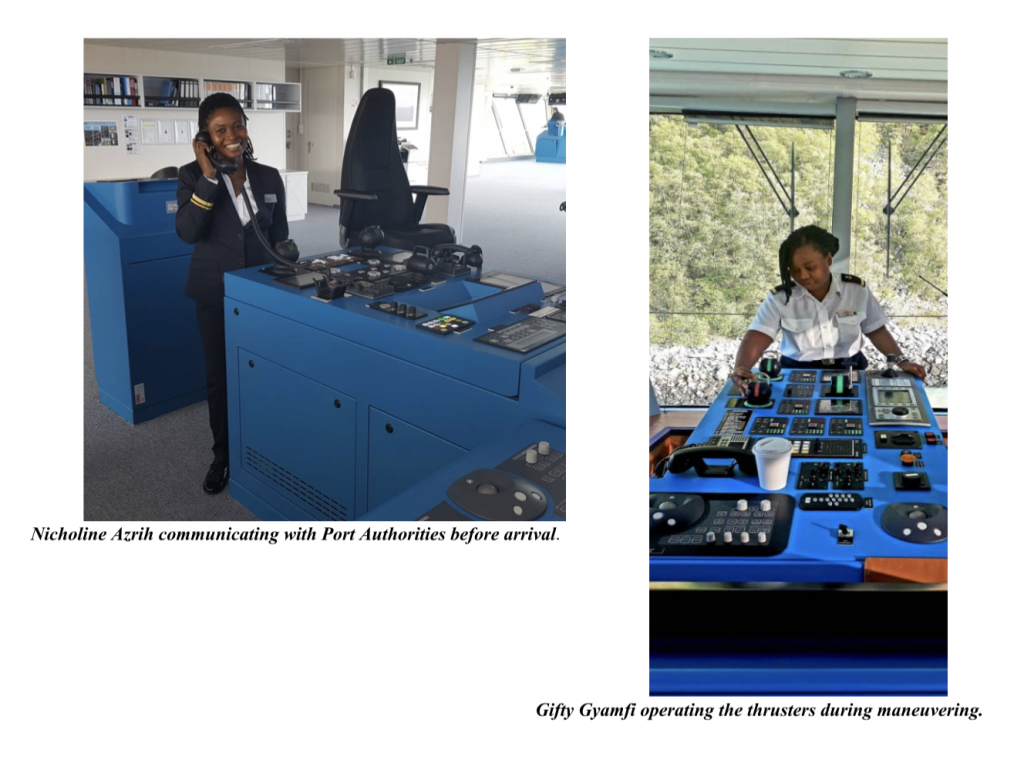
Training of officers of the Ghana Navy in Bridge Resource Management
The Nautical Science Department is noted for the training of officers of the Ghana Navy in Bridge Resource Management, Automatic Radar Plotting and Passage Planning using the Electronic Chart Display and Information System (ECDIS). The Department boasts of the state-of-the-arts Bridge Simulator and EDICS Simulator for training purposes.
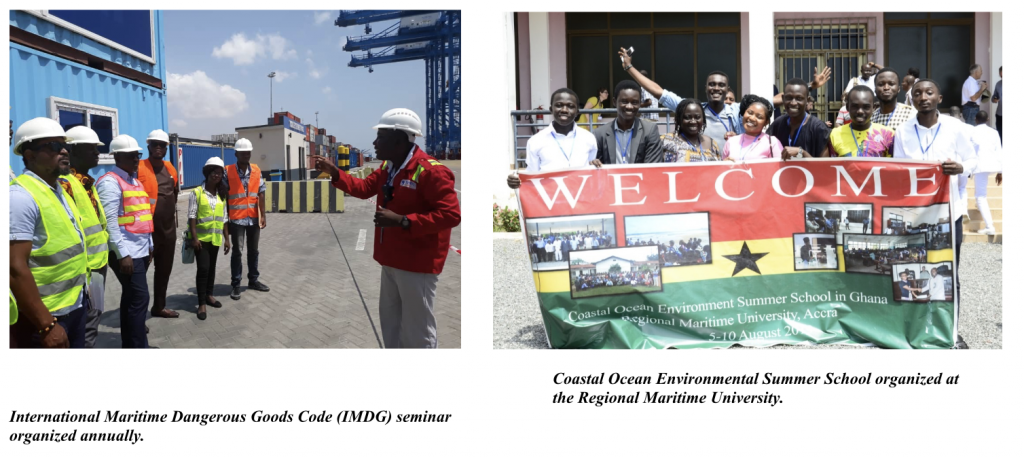
There have been successive achievements of the department in the organization of International Maritime Dangerous Goods Code (IMDG) seminar for the past decades. Again there are successful stories in the organization of Summer School (i.e. Coastal Ocean Environmental Summer School) since 2015.
Future aspirations of the department includes being the preferred choice for nautical studies and shipboard career development and advancement in the country and the sub region. The Department also aspires to have a strong and confident strategic partnerships with stakeholders in the maritime industry to enhance maritime education and training.
Most of the world’s trade is carried by sea. With a BSc. Nautical Science or Diploma Nautical Science you can become a professional in this exciting and vital industry. If you are an adventurer and want to pursue a profession where you will get to discover the farthest depths of seas, a BSc in Nautical Science or Diploma in Nautical Science is an ideal program to begin with.
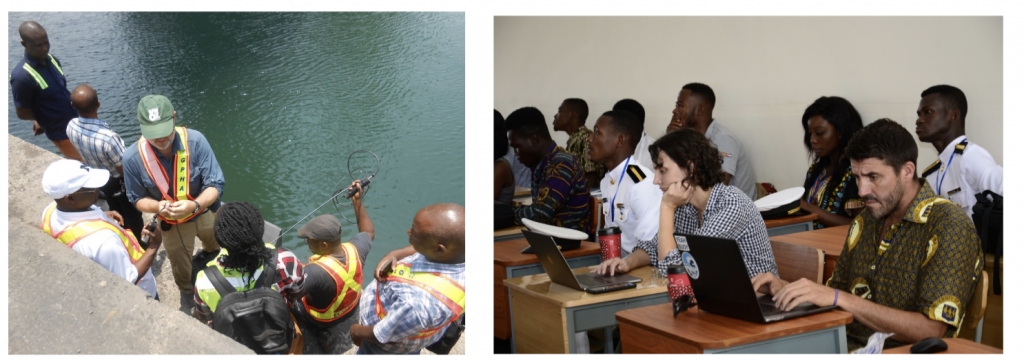
Our Certificate of Competency programs are accredited by the Ghana Maritime Authority and meet the requirements set out in the International Convention on Standards of Training, Certification and Watch-keeping for seafarers (STCW 2010). We make use of our full mission Bridge and ECDIS simulators in the teaching of our programmes.
FUTURE ASPIRATIONS OF THE DEPARTMENT
By studying our programmes us, you will develop the skills required to join the next generation of leaders in the maritime industry.
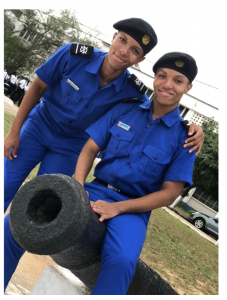
Slogan: Together we sail.
Information Source: Marketing Unit, RMU.
MARINE ENGINEERING DEPARTMENT, RMU
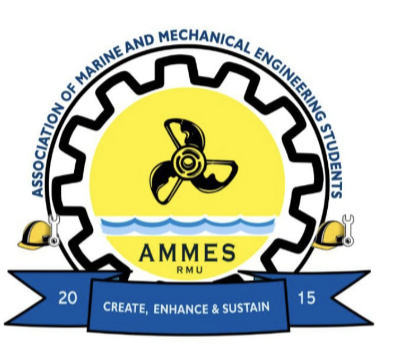
The Marine Engineering Department offers Bachelor (degree) and Diploma programmes in Marine Engineering and Mechanical Engineering. The Marine Engineering Department also runs upgrading courses for professional seafarers preparing for their Engineer Officer Certificates of Competency (COC) examinations conducted by the Ghana Maritime Authority. It provides engineering based maritime education and training that matches modern technologies and innovations in shipboard operations on merchant ships, fishing vessels and allied industries.
Some objectives of the Marine Engineering Department aim at providing world-class education and training through the use of state-of-art facilities of the University to educate and instil professional, technical, critical-thinking and communication skills into students.
Programmes offered by the department are:
Bachelor and Diploma programmes
- B.Sc. Marine Engineering
- B.Sc. Mechanical Engineering
- Diploma in Marine Engineering
- B.Sc. Oceanography and Marine Technology – Undergoing accreditation
- B.Sc. Naval Architecture (Small Craft or Ocean Engineering Options) – Undergoing accreditation
Postgraduate programmes
- MSc. Environmental Engineering
- MSc. Bio-Processing Engineering
- MSc. Subsea Engineering – Undergoing accreditation
- MSc. Coastal Environmental Management – Undergoing accreditation
Vocational Programmes/Courses
- Marine Engine Mechanic
- Naval Architecture Applications
- Ship Construction for Carpenters
- Refrigeration and Air Conditioning
- Welding and Fabrication levels I, II & III
- Piping and Instrumentation Diagram (PI&D)
- MaxSURF
- AutoCAD Levels I, II & III
FACILITIES AT THE DEPARTMENT
The Marine Engineering Department is accredited with the world class facilities such as classrooms, offices, laboratories, workshops, and other essential resources available to conduct all workshop practices. Below are pictures of some of the facilities and laboratories.
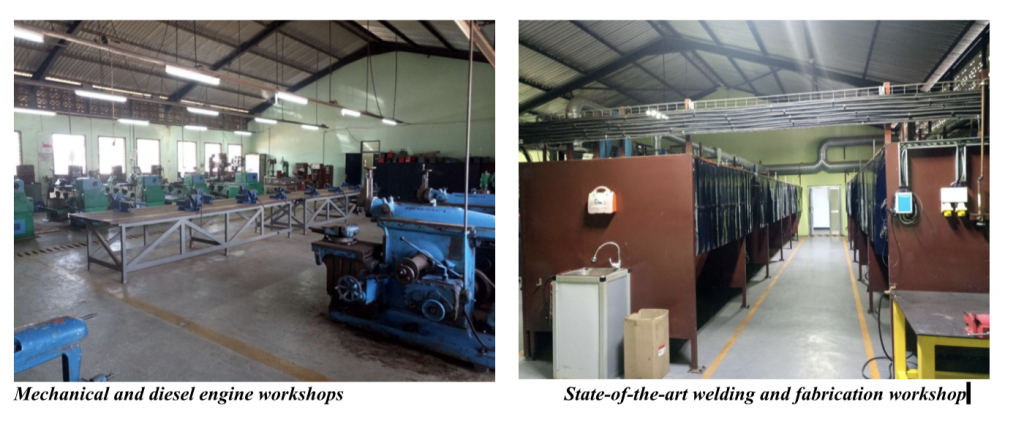
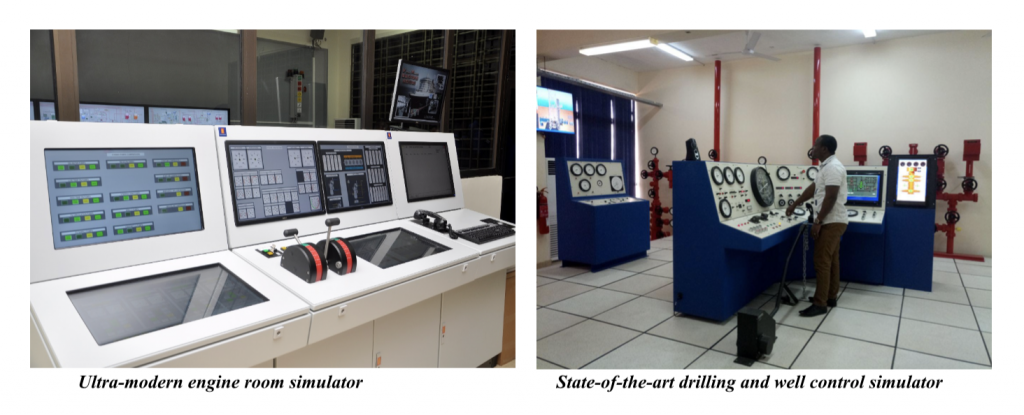
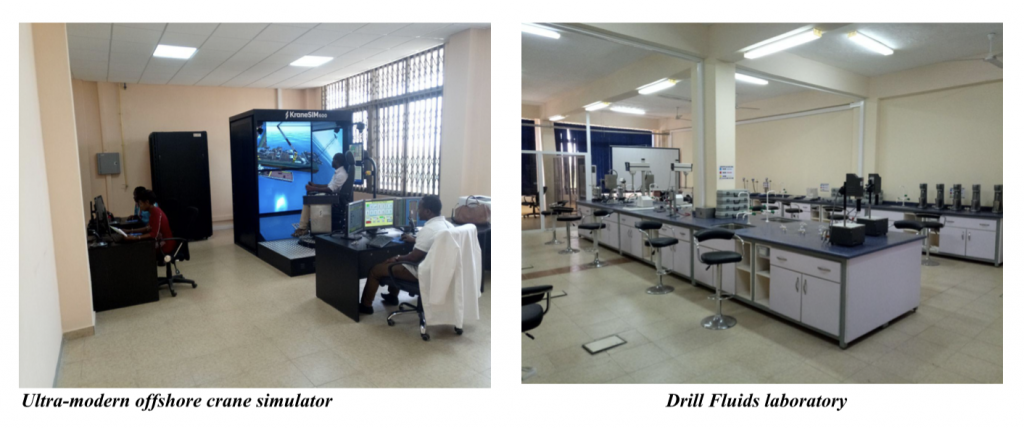
The Mechanical/ Welding and Fabrication Workshop trains students in metal arc welding (MAW). At the centre, knowledge in applied basic metallurgy, introduction to blueprint reading and sketching, measurements and acquisition of welding skills in the flat, horizontal and vertical positions are taught and practised.
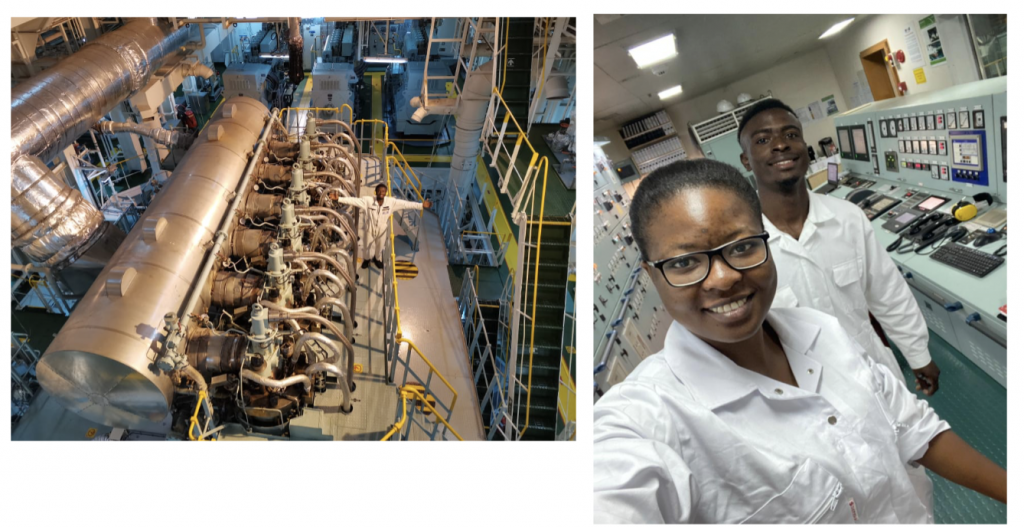
Students from the Marine Engineering Department (pursuing any of the programmes of the Department) are equipped to aspire to Engineering or managerial positions on board merchant ships or shore-based institutions. Students from the Department learn about the whole spectrum of engineering practices and are enabled to apply engineering principles in the solution of problems.
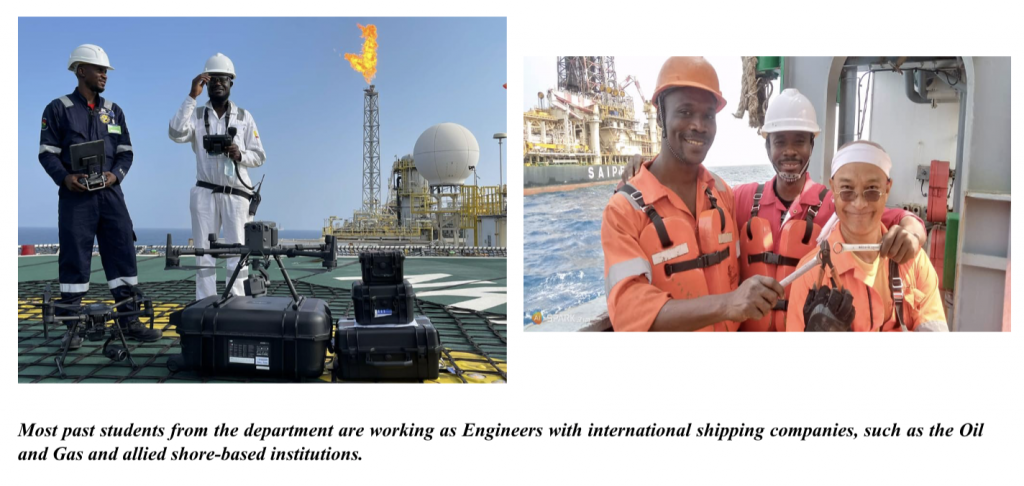
FUTURE ASPIRATIONS OF THE DEPARTMENT

The Department aspires to produce world-class graduates to occupy administrative, managerial and operational positions. By choosing to study Marine Engineering or Mechanical Engineering, you will be prepared for a lifelong career in engineering, leadership and service. You will be equipped to undertake research and innovation in line with current trends in the Maritime Transport Industry.
Slogan: #AMMES, dream to achieve.
Information Source: Marketing Unit, RMU.
DEPARTMENT OF BUSINESS STUDIES
The Business Studies Department offers Bachelors (degree) and Diploma programmes in business related disciplines. The Department aims at producing graduates with the knowledge, skills and disciplines essential to enable them perform at the middle level of management of the accountancy profession. Graduates of the Department are eligible for employment in the manufacturing industry, commerce or academia in the private or public sectors of the economy.
Programmes offered by the Department.
- B.Sc. Accounting
- B.Sc. Procurement and Operations Management
- Diploma in Accounting with Information Technology
New programmes (going through accreditation process)
- BSc. Marketing and International Business
FACILITIES OF THE DEPARTMENT
The Department has spacious and well-furnished classrooms for lecturing. We have access to the University’s library and e-learning centre as well.
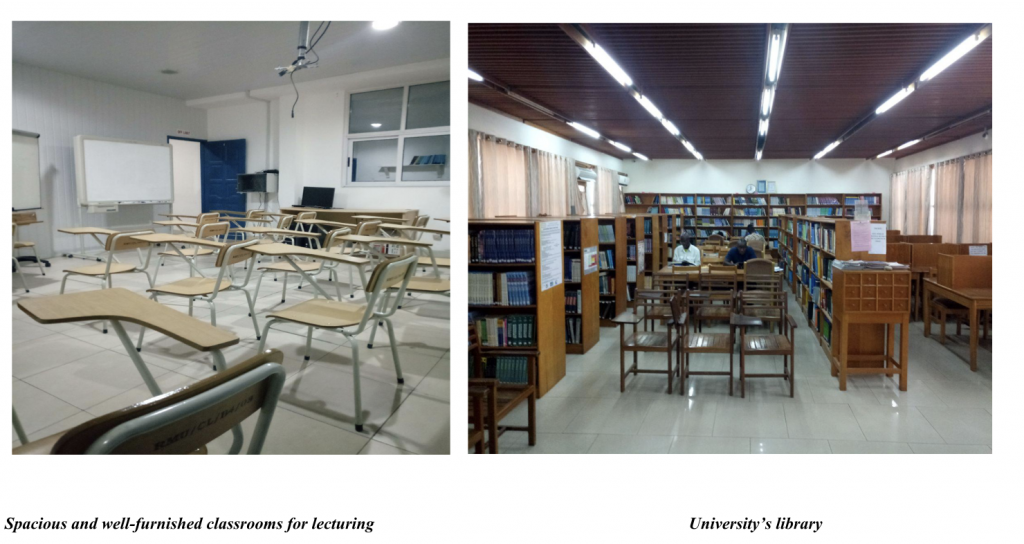
OBJECTIVES OF THE DEPARTMENT
- To enable students acquire appropriate level of proficiency in applying accounting and auditing knowledge, skills and discipline in the working environment.
- To enable students obtain an understanding of managerial principles essential to the performance required at the work place.
- To equip students with the fundamentals of economics, law, taxation, quantitative techniques, finance and computerized information systems which are considered essentials for the performance of the accountancy profession.
- To lay the foundation for the acquisition of further professional or academic advancement to enhance career development in industry, commerce and academia.
Graduates from the Department are in top managerial /supervisory positions all over the world.
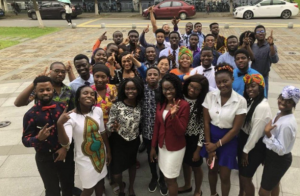
FUTURE ASPIRATIONS OF THE DEPARTMENTS.
The Department intends to introduce BSc. Banking and Finance as a new programme. By pursuing any of our business programmes, you will be equipped to track income and expenditures, ensure statutory compliance, and provide investors, management, and government officials with the quantitative and financial information useful in making business decisions.
Information Source: Marketing Unit.
Professional & Vocational Programmes
Pre-Sea Vocational Training Programme
Entry Requirement:
Middle School Leaving Certificate or Basic Education Certificate (JHS/JSS), Senior Secondary School Certificate Examination (SSSCE), WASSCE, GCE ‘O’ Level or equivalent Technical Certificate, and HND
This course is endorsed by the Ghana Maritime Authority as a pre-requisite for the issuance of the Seaman’s Discharge Book.
Course Duration – Six (6) Weeks
Course Fee – $300.00
Admission Form – GH¢60.00
Programmable Logic Controller Training – Basic Level
MARINE ENGINE / MARINE REFRIGERATION MECHANIC
(ONE SEMESTER PROGRAMME)
Marine Engine Mechanic is a six months vocational programme by the Regional Maritime University under the Faculty of Engineering, Marine Engineering Department. The programme seeks to give participants broad Technical and General Mechanical expertise in Engine Room Operation and its Maintenance.
Who is it for?
For persons interested in becoming highly qualified Motor-man (a qualification to aid the 2nd Engineer) on board Merchant and Local ships. The Vocational programme aims to produce graduates with expertise as Motor-man/ Oiler/ Wiper capable of combining technical and scientific skills with an understanding of the Engine room operations and maintenance, the Oil and Gas industry operations as well as land-based industries.
What is covered?
- Engineering Science
- Basic Workshop Practice
- Electrical Engineering Science
- Seamanship
- Mathematics
- General Ship Knowledge
- Marine Diesel Engines
- Marine Plant Operations and Maintenance
Benefits to you
- Participants will explore major environmental concerns: Ports trips, hands-on engine room practical’s and learn proactive approaches to solve these environmental problems as Motor-man/ Oiler/ Wiper on-board shipping vessels.
- Land-based jobs exist for M.E.M students in the Maritime industry as well as Mechanical Workshops.
- An M.E.M graduate/ motorman may advance to the officer class based on performance in the industry.
Entry Requirements: Middle School Leaving Certificate/Basic Education Certificate (JHS), SSSCE, WASSCE G.C.E. ‘O’ Level or equivalent.
BASIC WELDING AND METAL FABRICATION COURSE
The Vocational Training Centre of the Regional Maritime University (RMU) introduces the following short courses:
- WELDING & FABRICATION LEVEL ONE (SIX WEEKS)
- WELDING & FABRICATION LEVEL TWO (SEVEN WEEKS)
- PIPE WELDING (SIX WEEKS)
- MACHINE SHOP PRACTICE I (LATHE WORK AND DRILLING OPERATIONS)
The various courses introduce participants to Shielded Metal Arc Welding (SMAW) knowledge in applied basic metallurgy, measurements and acquisition of welding skills in the flat, horizontal and vertical positions. By progressing to the fourth course, training will cover the principles of machining, measurement, tool grinding, and machine shop safety etc.
Who is it for?
This course targets persons seeking to acquire skills in basic welding & fabrication practice. RMU welding programme is a foundation course which leads to Level II (welding and fabrication), Pipe welding and other specialized areas in welding. This programme is for persons seeking to acquire vocational skill through practical hands-on training.
Benefits to you
- The training prepares students for the job market and equips them with entrepreneurial skills required to operate small to medium scale welding shops.
- The Welding & Fabrication II opens opportunities into the Oil and Gas Industry for candidates.
- The course prepares candidates with skills for the Maritime Industry as well as to acquire specialization in other branches of the welding vocation.
- Candidates will also acquire skills in blueprint reading and sketching.
Entry Requirements: Basic Education Certificate (JHS), SSSCE, WASSCE G.C.E. ‘O’ Level or equivalent.
iii. PRE-SEA VOCATIONAL TRAINING PROGRAMME
Entry Requirements: Middle School Leaving Certificate or Basic Education Certificate (JHS/JSS), Senior Secondary School Certificate Examination (SSSCE), WASSCE, GCE ‘O’ Level or equivalent Technical Certificate and HND.
The above programme is endorsed by the Ghana Maritime Authority as a pre-requisite for the issuance of the Seaman’s Discharge Book.
- REFRIGERATION AND AIRCONDITIONING MECHANIC (15 WEEKS)
Entry Requirements: West Africa Senior School Certificate Examination (WASSCE)/Senior Secondary School Certificate (SSSCE) Holders: Pass in three (3) core subjects: English Language, Mathematics and Integrated Science, plus elective Technical Drawing OR Basic Education Certificate Examination and minimum of two (2) years refrigeration and air condition apprenticeship.
Benefits
- To be equipped with hands-on Refrigeration and Air Conditioning mechanic (in domestic, industrial and vehicle)
- Be proficient in the use and maintenance of hand and power tools to the standard and safety required in the trade
- Have a thorough knowledge of the principal components of refrigeration systems, heat/cool units and air conditioning
- Have an intimate knowledge of other mechanical trades which contribute to Refrigeration and Air conditioning systems
- Be empowered to exercise good judgement and resourcefulness in construction, maintenance and workplace health and safety etc.
JOB PROSPECTS/BENEFITS
- Graduates of the Regional Maritime University are eligible for employment as sea-going or shore-based personnel in reputable organizations worldwide as RMU Certificates have international accreditation and recognition;
- Graduates gain a dual career option and so are competent both at sea or ashore with an academic/professional qualification providing opportunities for career progression to Chief Engineer, Captain, Maritime Administrator, Electrical Engineer, ICT Professional;
- You will be exposed to a wide array of additional programmes including Oil and Gas Training;
- You will get to do internships with world-class organizations such as Tullow Oil; Bernard Schulte Ship Management, etc.
- You will be equipped to take up supervisory and middle-level management positions in shipping agencies, maritime and transport related ministries, export and import industries etc.
AutoCAD BASIC / INTERMEDIATE DURATION: (FIVE DAYS)
The AutoCAD Basic/Intermediate introduces basic techniques and tools required to enable proficiency in the use of AutoCAD software and in creating and editing simple drawings. Candidates will be exposed to concepts such as understanding AutoCAD workspace/user interface, opening an existing drawing, using the drawing and modifying tools, creating layers, text manager, dimension manager, leader manager and tables etc.
Benefits
- You will be equipped to understand the fundamental tools involved in using AutoCAD.
- Graduates will be empowered to build competence with how to use tools required for Computer Aided Designs.
- To navigate throughout AutoCAD using major navigating tools and understand the concept and techniques in drawing.
- Exposed to the use of AutoCAD for multiple designs using several tool. It is expected that candidates will be able to create layers to control the objects’ visibility and use constraint for certain designs.
- Candidates will be enabled to create complex drawings, inserting blocks and X ref including customizing drawing templates.
AutoCAD ADVANCED DURATION: THREE DAYS)
The AutoCAD Advanced introduces the concepts behind isometric drawings, 3D modelling in AutoCAD. This course provides candidates with the needed proficiency in the use of AutoCAD software in creating and editing 3D drawings. Topics to be covered includes solid modelling and editing demands, creating 3D models from 2D models and rendering models, plotting 3D models or exporting as images for presentation and many more.
Benefits:
- To understand the fundamental tools involved in using AutoCAD for Isometric drawings.
- Create 3D models from 2D designs.
- Be exposed to the use of solid modelling, surface modelling and mesh modelling techniques.
- Equipped to creating multiple viewports.
- Prepare candidates to produce visualizations of models incorporating materials.
- To produce visualizations of models incorporating lighting.
- Have control in interpreting drawings and presentations.
AutoCAD PLANT 3D DURATION: FIVE (5) DAYS
AutoCAD Plant 3D is a plant layout design tool used by designers and engineers to model and document process plants in 3D. AutoCAD Plant 3D teaches new users how to use key features for building, maintaining and creating content for 3D process plant models. Sessions cover creating projects and P&IDs, creating structures, creating equipment, editing specifications and catalogues, adding valves, fittings and pipe supports, creating orthographic drawings and managing data and creating reports.
Benefits:
- Candidates will have comprehensive overview of the AutoCAD P&ID and AutoCAD Plant 3D.
- Candidates will be able to setup projects and administration.
- Candidates will be equipped to create P&IDs using symbols related to various standards such as PIP, ISO, ISA, DIN, and JIS-ISO.
- The program will enable candidates to edit specifications and catalogs.
- Candidates will gain intrinsic knowledge into Plant layout and arrangements.
- Candidates will be able to generate isometric drawings, which can be used to manufacture.
AUTODESK ADVANCE STEEL DURATION: FOUR (4) DAYS
Steel fabricators typically have very specific standards that govern how their documents look (and what their crews are expecting to see on those documents), candidates for this course will explore how to customize Advance Steel software to accommodate fabricator standards, produce common CNC (computer numerical control) files, and automatically create documents that display the information that fabrication crews can easily read and interpret. The overall goal is to enhance productivity and reduce rework and fabrication errors through customization tools within Advance Steel software.
Benefits
- Candidates will be enabled to understand the fundamental tools involved in using Autodesk Advance Steel.
- Candidates will learn how to customize the automatically generated fabrication drawings in Advance Steel to the liking of a steel fabricator.
- This program will enlighten candidates to incorporate custom connections that are commonly used by a steel fabricator for easy reuse on all detailing projects.
- Candidates will be equipped to create 3D models and associated documents in the shortest possible time.
- Candidate will be able to automatically generate shop drawings and general arrangement drawings to your specifications with flexible formatting options.
- The program will broaden the scope of candidates to better understand best practices and pitfalls to avoid in Advance Steel to generate consistent, quality output drawings and data
Job Prospects for AutoCAD
- Graduates of this program are eligible for careers in drafting and design technologies.
- Candidates gain dual career opportunity as Electrical / Mechanical Drafters
- Training acquired equips graduate as architectural and civil drafters.
- Knowledge acquired poses you ready in industrial environmental as industrial designers.
1. Develop strong fundamentals in the knowhow of PLC
2. Develop strong skills in industrial and domestic PLC
3. Identify the various components of a PLC, principles of operation, applications, types and modifying operations etc.
4. Identify and understand PLC work stations, input/output modules and specifications, central processing units, memory types and design, saving and retrieving of data from PLC.
5. learn what relays, sensors, timers, counters & contactors do and how they are used
6. Check and confirm status of PLC, write and edit PLC programs.
7. Develop circuits from Boolean algebra, ladder, program word level logic instructions and SFC etc.
8. Understand PLC programming languages, instruction addressing, flag & branch instructions ladder diagram entering etc.
9. Understand PLC programming and wiring and write various programmes
10. Practically hard wire and program PLC to perform various functions.
11. Confirm communication between PLC and PC
12. Diagnose PLC problems, online, monitor mode, upload, download, write mode and monitor application.
TOPICS TO BE COVERED
- Fundamentals of programmable logic controllers
- Basics of PLC programming
- Programmable logic controllers wiring and programming
- Programming timers, branch instructions, flags, bit instructions, byte instructions, counters etc.
TARGET GROUPS
The training is highly recommended for professionals who handle or work with electromechanical and automated machinery interested in gaining PLC knowledge including:
- Electrical professionals, Engineers, Technicians and technician engineers
- Electricians with practical know-how.
DURATION:
TRAINING FEES: GH¢400.00 (FOUR HUNDRED GHANA CEDIS)
Applicants will be required to attend a selection interview.
Need More Information?
WE’RE HERE TO HELP
Call or Email us:
(00233)(0)205003366
[email protected]
Regional Maritime University
Nungua, P.O. GP 1115
Accra, Ghana
Mon – Fri 8:00A.M. – 4:00P.M.Send a message
Why Study at RMU?
Founded in 1958, the Regional Maritime University is one of the oldest maritime universities in Africa and boasts a rich and proud history.
Our courses are developed in collaboration with industry and government bodies, placing our highly skilled graduates in high demand across the globe.
We are ISO certified and globally recognised as being a centre for excellence. Our specialist teaching, learning and research facilities are internationally acclaimed and are utilised by government bodies and maritime-related businesses world-wide.
RMU/SMTC Oil & Gas Centre
The Oil & Gas Safety Training Centre at the Regional Maritime University (RMU) has been established to conduct safety mandatory courses for the Offshore Oil & Gas Industry. There are only a couple of such centres in Africa.
It is worthy to note that the RMU has been able to achieve this feat in collaboration with {Sibrima Maritime Training Centre} SMTC Global, a world-renowned maritime training concern with 22 years experience, which has training centres in Malaysia, Singapore, Saudi Arabia and now, Ghana. SMTC has plans to train Ghanaians to partake in the training of participants.
Significance of the Training
The establishment of the safety training centre will ensure Ghanaian participation in all sectors of the nation’s Oil & Gas Industry, i.e. the upstream, midstream and downstream sectors.
Oil Companies in Africa, hitherto, have been sending their staff to Europe and elsewhere for such specialized training, obviously, at great expense.
Benefits
- Create employment opportunities;
- Easy and cost effective to train the local manpower requirement for the oil industry;
- Less prone to cause accidents which would be costly and damaging to the marine environment;
- No need to wait in long queues in Europe for such specialized training;
- It is mandatory for visitors to the offshore oil platforms to do the HUET training;
- To ensure nationals participation in all sectors of the Oil & Gas Industry;
- The training programme will satisfy the Government’s quest to introduce local content into the nation’s Oil & Gas workforce.
Who Qualifies for Training?
– Policy and law makers visiting the oil rigs;
– Rig & Barge Engineers/Technicians/ Movers;
– Platform Managers/ Offshore Installation Mangers;
– Stability & DP Operators;
– Mechanics, Engine Room Operators, Crane Operator/Deck Foreman;
– Rig Superintendents, Offshore Toolpusher, Drillers, Roustabout, Roughneck;
– Technical Section: Engine Room Operator, Motorman, Welder, Rig Mechanic, Radio Operator
– Electronic Technicians, etc. etc.
Training covers ALL Upstream workers: those engaged in exploration, drilling and operation.
– Midstream: transportation of Oil & Gas from the exploration site to refineries
– Downstream: final processing, distribution and marketing of oil-related products.
Training Content:
For a start, participants will be trained to OPITO approved Basic Offshore Safety Induction and Emergency Training (BOSIET) and Tropical-BOSIET (TBOSIET).
This course involves:
- Helicopter Underwater Escape Training (HUET) with emergency Breathing System [EBS]
- First Aid
- Sea Survival
- Fire-fighting & Self Rescue
- Offshore Safety Induction
Duration of Courses:
- 2½ days for BOSIET and TBOSIET
When Will Training Commence?
The RMU in partnership with SMTC Malaysia is ensuring that Basic Offshore Safety Induction and Emergency Training (BOSIET) course starts in middle of August, 2010 after successfully going through OPITO (Offshore Petroleum Industry Training Organization) audit.
Minimum Industry Safety Training (MIST) is an introductory safety training programme designed to introduce the fundamental safety elements of the offshore oil & gas industry to new starts, giving an appreciation of the potential hazards and controls that might be encountered by personnel offshore. Each unit has been designed to focus the delegates’ attention on their personal responsibility for safety thus influencing their behavior and attitude towards their co-workers, the installation and the environment.
The course modules include:
- Introduction to the Hazardous Offshore Environment
- Working Safely Including Safety Observation Systems
- Understanding the Risk Assessment Process
- Tasks that require permit to Work
- Personal Responsibility in Maintaining Asset Integrity
- Using Manual Handling Techniques Everyday
- Controlling the Use of Hazardous Substances Offshore
- Knowledge and Practices of Working at Height
- Being Aware of Mechanical Lifting Activities
Need More Information?
WE’RE HERE TO HELP
Call or Email us:
(00233)(0)205003366
[email protected]
Regional Maritime University
Nungua, P.O. GP 1115
Accra, Ghana
Mon – Fri 8:00A.M. – 4:00P.M.Send a message
Why Study at RMU?
Founded in 1958, the Regional Maritime University is one of the oldest maritime universities in Africa and boasts a rich and proud history.
Our courses are developed in collaboration with industry and government bodies, placing our highly skilled graduates in high demand across the globe.
We are ISO certified and globally recognised as being a centre for excellence. Our specialist teaching, learning and research facilities are internationally acclaimed and are utilised by government bodies and maritime-related businesses world-wide.
Prior to the 2003/2004 academic year, the university was running only certificate and Higher Diploma programmes. From the 2003/2004 academic year the semester/course credit system was instituted.
THE GRADING SYSTEM
Since the adoption of the semester/course-credit system, the grading system has been as follows:
GRADING SYSTEM FROM 2003/2004 TO 2005/2006 ACADEMIC SESSION
| GRADE | % MARK | GRADE POINT (GP) | INTERPRETATION |
| A+ | 80-100 | 4.00 | Outstanding |
| A | 70-79 | 3.85 | Excellent |
| A- | 65-69 | 3.75 | Very Good |
| B+ | 60-64 | 3.50 | Good |
| B | 55-59 | 3.00 | Above Average |
| B- | 50-54 | 2.50 | Average |
| C+ | 45-49 | 2.00 | Pass |
| C | 40-44 | 1.50 | Pass |
| D | 30-39 | 1.00 | Fail |
| F | 0-29 | 0 | Fail |
| X | – | 0 | Fail |
| Z | – | – | Disqualification |
| I | – | – | Incomplete |
| Y | – | – | Continuing |
Beginning 2006/2007 academic year the grading system was modified to read as follows:
GRADING SYSTEM FROM AUGUST 2006/2007 TO JULY 2008 ACADEMIC SESSION
| GRADE | SCORE | GRADE POINT (GP) | INTERPRETATION |
| A+ | 80-100 | 4.00 | Outstanding |
| A | 70-79 | 3.85 | Excellent |
| B+ | 65-69 | 3.50 | Very Good |
| B | 60-64 | 3.00 | Good |
| C+ | 55-59 | 2.50 | Above Average |
| C | 50-54 | 2.00 | Average |
| D+ | 45-49 | 1.50 | Pass |
| D | 40-44 | 1.00 | Weak Pass |
| F | 0-39 | 0 | Fail |
Beginning of 2008/2009 academic year, the grading system was again modified to read as follows:
GRADING SYSTEM FROM AUGUST 2008 TO DATE
| GRADE | SCORE | GRADE POINT (GP) | INTERPRETATION |
| A | 80-100 | 4.00 | Outstanding |
| A- | 70-79 | 3.85 | Excellent |
| B+ | 65-69 | 3.50 | Very Good |
| B | 60-64 | 3.00 | Good |
| C+ | 55-59 | 2.50 | Above Average |
| C | 50-54 | 2.00 | Average |
| D | 45-49 | 1.50 | Pass |
| E | 40-44 | 1.00 | Weak Pass |
| F | 0-39 | 0 | Fail |
ALSO, READ ABOUT UEW CUT-OFF POINT FOR MATURE EDUCATION



